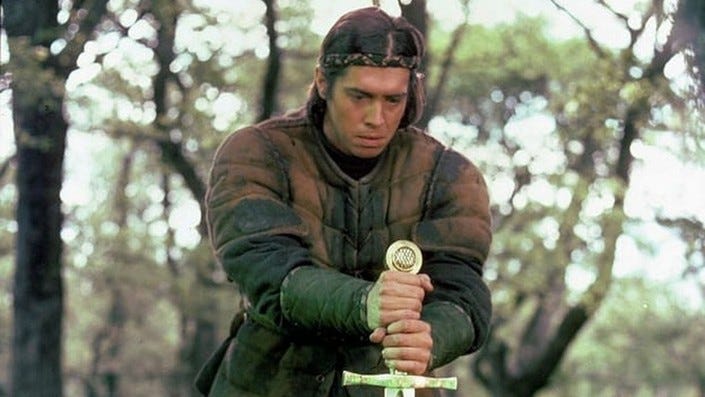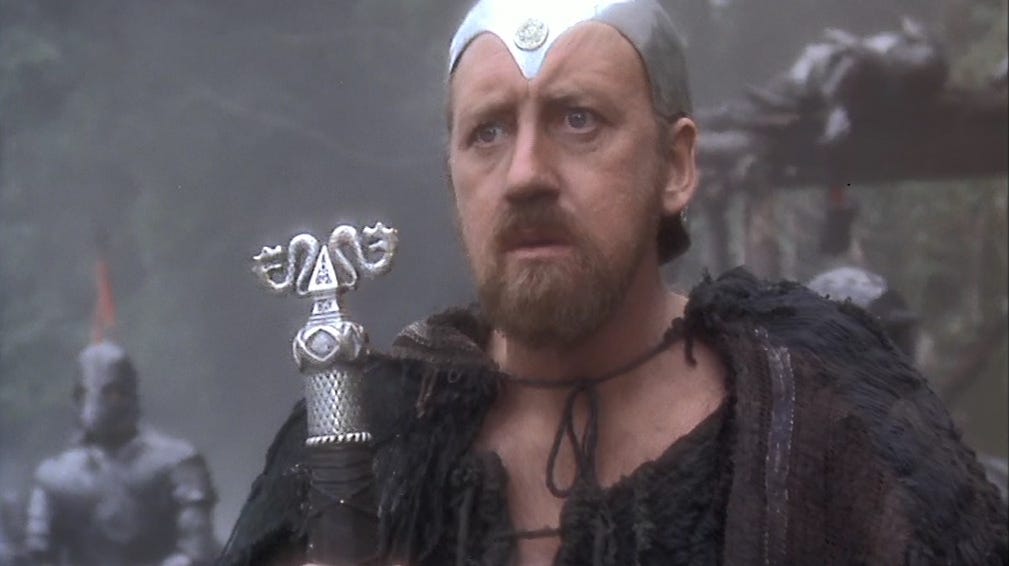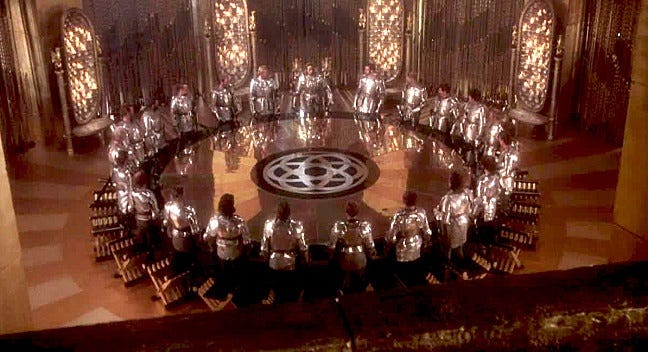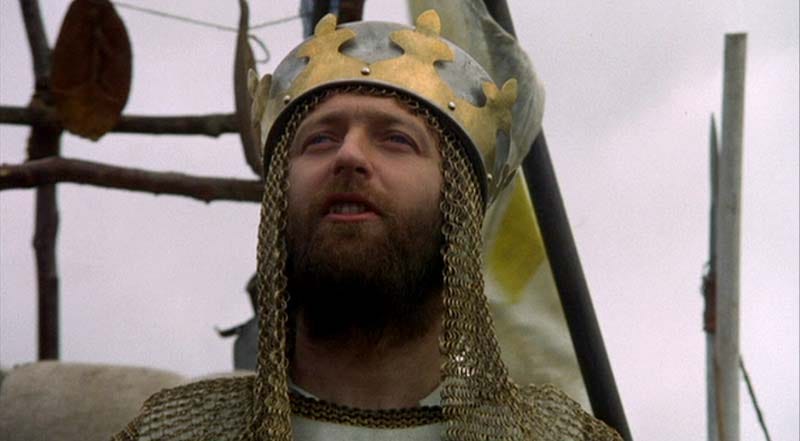Joyfully Two-Dimensional
Excalibur
This essay accompanies this week’s episode of Fifteen-Minute Film Fanatics, a podcast that often breaks the promise of its title but never wastes the listener’s time. The post and the podcast complement each other; the post isn’t a transcript of the podcast. We take requests, so leave a comment below if there’s a film you’d like us to cover. We’ve done over three hundred episodes that you can find on Spotify, Apple, or wherever you get your podcasts. Check out the back catalogue for episodes on your favorite films—or give us some you’d like us to cover. Please subscribe and listen wherever you get your podcasts and consider leaving a review on your platform of choice. Thanks.
We’ve seen many attempts at transferring the pages of Thomas Mallory’s Le Morte d’Arthur to the frames of a film, but none of them capture the spirit of the original quite like Excalibur, John Boorman’s 1981 adaptation that can be called, without insult, “aggressively two-dimensional” as co-host Mike Takla does in a recent episode of FMFF. To that I’d add it’s joyfully so: the film isn’t two-dimensional because Boorman and co-screenwriter Rospo Pallenberg somehow failed. It’s two-dimensional because they succeeded in adapting the experience of reading Mallory to another medium.
When we praise faithful adaptations—David Lean’s Great Expectations, The Coens’ No Country for Old Men, Richard Linklater’s A Scanner Darkly—we do so not only because they retell the original story and the actors and settings resemble the mental pictures we formed as we read. We praise them because they help us, in a different way, re-experience the original work. Great Expectations doesn’t “cover” the entire novel, but it does give the viewer the sense of place and people found in Dickens’ pages. The viewer of No Country feels like the reader of the novel, trying (along with Sheriff Bell) to make sense of a changing world. And the rotoscope animation of Scanner certainly gets the reader into Philip K. Dick’s headspace more than a simple retelling of its labyrinthine story of an undercover cop.
The Shining, Psycho, Jaws, and The Godfather are all excellent films, but not faithful adaptations. Their infidelity to their sources make them better movies, but that’s another story.
Excalibur is jarring to a contemporary viewer in a way similar to that of a reader opening Le Morte d’Arthur five-hundred-and-forty years after it was printed by William Caxton. Watching the frames isn’t like reading the pages because there are knights, swords, and horses, but because Boorman’s direction mimics Mallory’s style.
Here’s a passage from Mallory in which the recently-crowned Arthur first faces the rival kings who question his legitimacy:
Then King Arthur came out of his tower, and had under his gown a jesseraunt of double mail, and there went with him the Archbishop of Canterbury, and Sir Baudwin of Britain, and Sir Kay, and Sir Brastias: these were the men of most worship that were with him. And when they were met there was no meekness, but stout words on both sides; but always King Arthur answered them, and said he would make them to bow an he lived. Wherefore they departed with wrath, and King Arthur bade keep them well, and they bade the king keep him well. So the king returned him to the tower again and armed him and all his knights. What will ye do? said Merlin to the kings; ye were better for to stint, for ye shall not here prevail though ye were ten times so many. Be we well advised to be afeared of a dream-reader? said King Lot. With that Merlin vanished away, and came to King Arthur, and bade him set on them fiercely; and in the meanwhile there were three hundred good men, of the best that were with the kings, that went straight unto King Arthur, and that comforted him greatly. Sir, said Merlin to Arthur, fight not with the sword that ye had by miracle, till that ye see ye go unto the worse, then draw it out and do your best. So forthwithal King Arthur set upon them in their lodging. And Sir Baudwin, Sir Kay, and Sir Brastias slew on the right hand and on the left hand that it was marvel; and always King Arthur on horseback laid on with a sword, and did marvellous deeds of arms, that many of the kings had great joy of his deeds and hardiness.
This reads like a novel, but not like the kinds of novels to which we have grown accustomed: there are characters, conflict, dialogue, and action, but everything is on the surface. Each sentence begins with a stated or implied “And”: one thing simply follows another and there’s never a sentence that moves the reader backwards or far forward in the timeline, as we see in modern fiction all the time. There’s no attempt to engage the reader with interesting turns-of-phrase or deliberate glimpses into the characters’ interior lives. The reader is left to fill in a number of gaps: what were the “stout words on both sides” or the “marvelous deeds of arms?” We’d like to hear and see them, but Mallory moves ahead with wonderful speed, as if he doesn’t have time for the digressions upon which modern novels are built. More happens in this paragraph than in whole novels we admire for their artistry, which is why nobody can really film Ulysses or The Ambassadors. Even the layout dates the prose and distances us from the interiority of those it describes—and if we reset the type too make it more visually resemble a modern novel, the effect would be almost the same:
“What will ye do?” said Merlin to the kings. “Ye were better for to stint, for ye shall not here prevail though ye were ten times so many.”
“Be we well advised to be afeared of a dream-reader?” said King Lot.
With that Merlin vanished away, and came to King Arthur, and bade him set on them fiercely; and in the meanwhile there were three hundred good men, of the best that were with the kings, that went straight unto King Arthur, and that comforted him greatly.
“Sir,” said Merlin to Arthur, “fight not with the sword that ye had by miracle, till that ye see ye go unto the worse, then draw it out and do your best.” So forthwithal King Arthur set upon them in their lodging.
There was a time when what we recognize as “psychological realism” was not the sine qua non of artistic quality. Besides, regardless of the differences in style, there’s still plenty of psychological realism in Mallory (and works thousands of years older): as on Shakedown Street, you just have to poke around. The difference is that Mallory’s aim is to tell the reader what happened; if we glean something beneath the surface, fine. This is the obverse of modern novels in which what happens isn’t as crucial as what the happening reveals. Nobody reads Ulysses because they’re grabbed by how Leopold Bloom moves throughout the heart of the Hibernian metropolis for a day. And while that’s an extreme example, we all expect some degree of an author deliberately illustrating depth of character when we read fiction written after The Decameron.
Excalibur approaches the material as if Mallory were holding the viewfinder. As in Le Morte d’Arthur, events in the film come one after another without transition; characters speak not in dialogue, but pronouncements and declarations of their emotions. Their inner and outer voices are perfectly aligned. When Uther Pendragon (Gabriel Byrne) sees Igrayne (Katrine Boorman) dancing at a feast, he bangs his fist on the table and says, “I MUST HAVE HER.” (One can sense the capital letters.) Later, when Arthur realizes that he must, once more, ride with his knights to defend what was, and the dream of what could be, he says, “Now, once more, I must ride with my knights to defend what was, and the dream of what could be.” The knights also wear their armor all the time: eating, drinking, sitting at the Round Table—even when Uther is laying with Igrayne, he is wearing enough plate mail to flatten her.
Boorman doesn’t want to make the characters more recognizable, but leave them as their alien selves to heighten the experience of cinematic time-travel to the England found in Mallory’s pages.
There is one other film that adapts the spirit of Mallory as well as Boorman’s. A friend of mine remarked that the two best portrayals of Arthur are Nigel Terry in Excalibur and Graham Chapman in Monty Python and the Holy Grail. He’s correct. Holy Grail is a parody, but like all great parodies, there’s an obvious enthusiasm for the thing being imitated, just as Boorman’s enthusiasm for Mallory is there on the screen. No great parody detests its source; parodies are labors of love. Like Mallory’s (and Terry’s) Arthur, Chapman keeps his head high, speaking in a diction that places him in another time, and strives for dignity, even when pretending to ride a horse with a coconut-clapping servant behind him. His earnestness adds to the jokes, of course, but it’s the same earnestness seen in Excalibur.
As with Mallory, none of this is pejorative. And there are terrific examples of Arthurian legends brought into the twentieth century, such as T. H. White’s The Once and Future King and (my favorite) Thomas Berger’s Arthur Rex, both of which retell Mallory’s story while making the characters more recognizable as contemporary figures. But for the true effect of time travel, you have to read Mallory—or watch Excalibur.







This is an awesome movie..The acting is right in your face & I thought Nicol Williamson was great.."It will not do us well in battle" was a great precursor to the final battle...Captain Picard,Liam Neeson,Helen Mirren(where they 1st hooked up)...Sheri Lunghi was so beautiful ..Your fine wording makes me almost want to pick up this book. Emphatically agree that those other named movie adaptations were better,something MUCH better(Jaws) than the source material.
Jack White's Camulod Chronicles. A long book (to be fair, not a film) series that makes the story come alive, and one of those few that reduced me to tears more than once. Of all the Arthurian tales I have read, and there are a few, this one takes the gold.